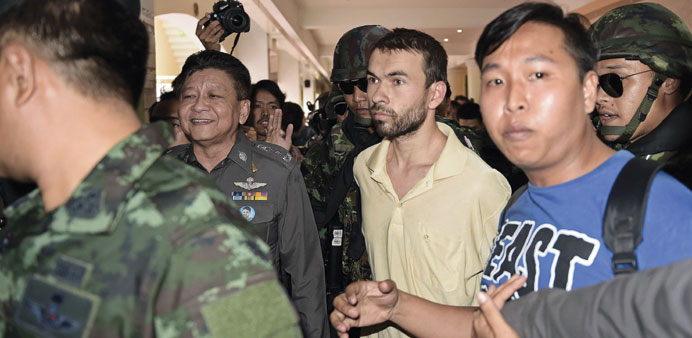Karadag is escorted by soldiers and led by national police spokesman Prawut Thavornsiri (left) to be questioned by police officers at Bangkok’s Metropolitan Police Station yesterday.
DPA/Bangkok
DNA samples taken from a suspect thought to have planted the bomb at Bangkok’s Erawan Shrine, killing 20 people last month, do not match those found in evidence, police said yesterday.
Police spokesman Prawut Thawornsiri said that the DNA samples do not match the DNA found in a taxi or on a banknote.
The main perpetrator was believed to be a man in a yellow shirt who was seen on surveillance camera footage putting down a backpack and leaving the site a few minutes before the bomb exploded.
Taxi drivers who had been in contact with the man in a yellow shirt had come forward to submit the evidence to police last month.
The suspect – identified by authorities as Chinese citizen Yusufu Mieraili – was arrested on Tuesday near the Thai-Cambodian border.
His fingerprints matched those found on bomb-making materials in an apartment raided at the weekend.
Mieraili has admitted to being at the shrine but denied planting the bomb.
“There is no evidence to confirm that he is the guy in a yellow shirt, but he is involved in the bombing,” Prawut told reporters.
The DNA samples of another suspect in custody, who was the first arrest in the case and identified as Adem Karadag, also do not match the evidence.
The results rule out two foreign suspects in custody – which means the main perpetrator is still at large.
So far in the investigation, eight arrest warrants have been issued and three suspects arrested.
On Thursday the Turkish embassy in Bangkok expressed its concern about “false information given in certain press reports that” the Karadag “is a Turkish citizen”.
Karadag reportedly used a fake passport to travel from Turkey to Vietnam before entering Thailand through the Thai-Cambodian border.
His apartment was raided by security forces on Saturday, and fake Turkish passports and bomb-making materials were found.
The arrest led authorities on Sunday to another suspect’s apartment, where more bomb-making materials were found.
The fingerprints found on the bomb-making materials match those of the second suspect, Mieraili.
The suspects belong to “a very large network” comprised of both Thai and foreign elements, Police Chief Somyot Poompanmoung said.
The apartment raided on Sunday is owned by Thai citizen Wanna Suansan, who is currently in Turkey and is wanted for questioning by Thai authorities.
Wanna said she is innocent and that she planned to return to Thailand to defend herself.
Authorities on Wednesday also issued an arrest warrant for Wanna’s husband, Emrah Davutoglu, who is also believed to be in Turkey, where he is thought to be a citizen.
The Post Today newspaper reported on Thursday that Thai police arrested a third person suspected of involvement in last month’s attack.
He was allegedly in contact via phone with Wanna.
Security analysts said that the bombing in central Bangkok did not fit the pattern of local and regional terrorist groups.
Some speculated that the most likely culprits were Turkish far-right groups unhappy with Thailand’s deportation of Uighur refugees to China in July.
Uighurs are a Muslim ethnic minority in northwestern China who speak a language related to Turkish.
Earlier yesterday the damaged statue of Brahma, the Hindu God of creation, at the shrine in the shopping district of Ratchaprasong was unveiled following restoration.
The culture ministry said it hopes the restoration will also “restore confidence in the country’s safety and bring good fortune to the people”.
A joint religious ceremony incorporating Buddhism, Hinduism, Sikhism, Islam and Christianity was held to honour the six Hindu God statues around the area.
Tourism to the country, which contributes more than 10% to gross domestic product, dropped 7% in the wake of the attack, according to the tourism ministry.

